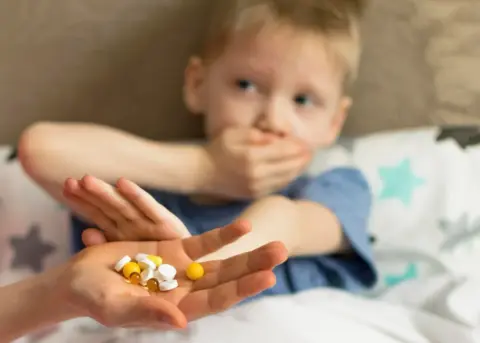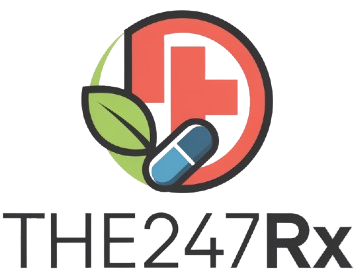 When bedtime turns into a battle, many parents look for solutions beyond bedtime stories and white noise machines. Enter melatonin, often hailed as a magic bullet for restless little ones. But is it actually safe for kids?
When bedtime turns into a battle, many parents look for solutions beyond bedtime stories and white noise machines. Enter melatonin, often hailed as a magic bullet for restless little ones. But is it actually safe for kids?
We’ll discuss more of this sleeping aid in detail based only on FACTS so you can make the best call.
Melatonin: What’s the Deal?
Melatonin isn’t some lab-created sleep potion. It’s a hormone naturally produced by the pineal gland, the tiny, but mighty part of the brain that tells the body when it’s time to sleep.
In short: Melatonin is what makes you feel sleepy when the lights go down.
Why More Parents Are Reaching for Melatonin
Melatonin supplements have skyrocketed in popularity among kids. And it’s not hard to see why.
Many parents turn to it after exhausting all the usual tricks, consistent bedtime routines, limiting screen time, even lullabies that could put adults to sleep. When nothing works, melatonin seems like an easy fix.
But here’s the thing: Just because it’s popular, doesn’t mean it’s without risks.
Is Melatonin Safe for Kids? Let’s Talk Facts.
Melatonin is widely considered safe for short-term use in adults. But kids? That’s where things get murky.
For Some Kids, It Might Help
Certain studies suggest melatonin can be beneficial, particularly for kids with autism spectrum disorder (ASD) or attention-deficit hyperactivity disorder (ADHD). In these cases, melatonin may help regulate sleep and cut down the time it takes to drift off.
Improvement of behaviour and mood was reported in 71% and 61% respectively. We conclude that melatonin remains an effective therapy on the long term for the treatment of CSOI in children with ADHD and has no safety concerns regarding serious adverse events or treatment related co-morbidity (Long-term follow-up of melatonin treatment in children with ADHD and chronic sleep onset insomnia – PubMed).
But There Are Some Big Questions…
1. Are the Doses Accurate? Not Always.
If you think the melatonin dosage on the bottle is exactly what’s inside, think again.
A study from the found that melatonin supplements can be wildly inconsistent. Some contain way more melatonin than advertised, while others have far less.
In this issue of the Journal of Clinical Sleep Medicine, Erland and Saxena systematically analyzed the actual melatonin content (and presence of contaminants) in 31 melatonin supplements purchased from groceries and pharmacies in one city in Canada (before countrywide OTC use of it in Canada was banned). Their findings herald what may also be true in OTC melatonin supplements marketed in the United States. Melatonin content varied from an egregious −83% to +478% of labeled melatonin and 70% had melatonin concentration ≤ 10% of what was claimed. Worse yet, the content of melatonin between lots of the same product varied by as much as 465% (Poor Quality Control of Over-the-Counter Melatonin: What They Say Is Often Not What You Get – PMC).
Why does this matter? Because even small variations can affect children differently, leading to unexpected side effects or ineffective results.
2. What About Long-Term Use?
Here’s where things get even trickier.
Research on long-term melatonin use in kids is limited. Some experts are concerned that messing with melatonin levels could interfere with natural hormone development, especially during puberty.
However, there are ongoing concerns based on studies in animals showing melatonin can affect puberty-related hormones. While there is very little evidence to suggest this is true in humans, the reality is no long-term clinical trials, which would settle the question, have yet been conducted (Melatonin for kids: Is it effective? Is it safe? – Boston Children’s Answers).
The reality? We just don’t have enough data to know for sure.
3. Side Effects Are a Thing
 Even though melatonin is a natural hormone, introducing it in supplement form isn’t always smooth sailing. Some kids may experience:
Even though melatonin is a natural hormone, introducing it in supplement form isn’t always smooth sailing. Some kids may experience:
- Daytime grogginess
- Headaches
- Dizziness
- Nausea
In rare cases, higher doses can lead to more serious reactions, another reason why dosage accuracy matters.
Quality Concerns
Let’s get one thing straight, just because melatonin is sold over the counter doesn’t mean every bottle is the same. Unlike prescription medications, the FDA doesn’t regulate dietary supplements with the same level of scrutiny. That means two seemingly identical melatonin products could have wildly different dosages or even contain mystery ingredients you weren’t expecting.
In short? Some melatonin supplements might be a gamble. And when it comes to your child’s sleep, that’s not exactly ideal.
Use of melatonin in children is considered “off label” or using a drug for a purpose or group of people other than what is officially recommended. The potential risks and benefits of using melatonin should be discussed directly with your child’s pediatrician (Melatonin for Kids: An Overview – Sleep Foundation).
Alternatives to Melatonin: Start Here First
Before you rush to the supplement aisle, there are other ways to improve your child’s sleep naturally. Melatonin isn’t the only game in town, and in many cases, good sleep habits work just as well, if not better.
Establish a Consistent Bedtime Routine
Kids thrive on routine. Going to bed and waking up at the same time every day helps set their internal clock. If bedtime is all over the place, no wonder sleep is a struggle.
Limit Screen Time Before Bed
The blue light from screens blocks natural melatonin production. Translation? Those pre-bedtime YouTube videos or last-minute gaming sessions are keeping your child’s brain wide awake. Try swapping screens for a bedtime story or other relaxing activities.
Create a Sleep-Friendly Environment
A dark, quiet, and cool bedroom = prime sleep conditions. If your child’s room is too bright, noisy, or warm, their body might not get the signal that it’s time to wind down.
Consulting Healthcare Professionals: Don’t Skip This Step
 If you’re considering melatonin for your child, the first stop should be your pediatrician or a sleep specialist. Every child is different, and a professional can help determine whether melatonin is the right choice, or if there’s an underlying sleep issue that needs to be addressed first.
If you’re considering melatonin for your child, the first stop should be your pediatrician or a sleep specialist. Every child is different, and a professional can help determine whether melatonin is the right choice, or if there’s an underlying sleep issue that needs to be addressed first.
Prioritize Good Sleep Hygiene First
Melatonin can be a helpful tool in some cases, but it’s not a magic fix. The concerns around dosage inconsistencies, potential side effects, and unknown long-term health consequences mean it should be used cautiously, especially in kids.
If your child struggles with sleep, focus on good sleep hygiene first. And before reaching for melatonin, consult a healthcare professional to make sure it’s truly the right solution.
Because when it comes to your child’s health, it’s always better to play it safe.
Where to buy Melatonin
Here are the most reliable and trusted sites where you can purchase Melatonin (Sleepy Owl):
| PillHeal | ✅ Discounted prices ✅ Free shipping on orders over $200 |
Visit |
